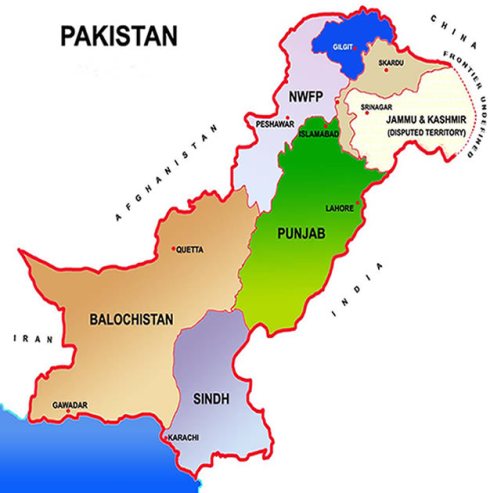
Benazir Bhutto 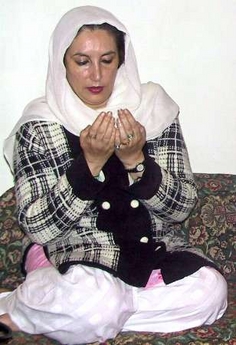
The Corrupted Leaders of Pakistan : Syed Yusuf Raza Gilani, Asif Zardari,
Nawaz Sharif and late Mohtarma Benazir Bhutto
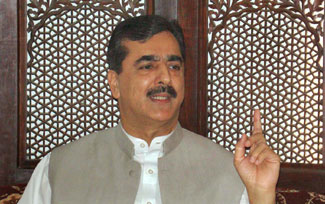
These are the leaders who made all Pakistani common people a fool for their personal gain. They love to divert the attention of Pakistani people from their real problem like education, employment and welfare to war plagued hysteria.
The rational Pakistanis should understand who their leaders and what credibility they have to rule Pakistan.
From the very beginning The leaders of Pakistan are fooling its people and making their own wealth. Let Pakistani people wake up from sleep and deprivation of their own rights. Pakistani people are to build their own fate not war and terrorism
Lets see the The contribution of Pakistan’s leaders ( Robbers who stole the fate of 150 million Pakistan.
Who is Syed Yusuf Raza Gilani?
Current Pakistan Prime Minister Syed Yousuf Raza Gilani an Asif Ali Zardari or the Bhutto family ‘s rubber stamp and puppet in the Parliament who On Sept 18, 2004, was sentenced to 10-year imprisonment with a fine of Rs5 million for corruption facing new charges, people have doubt Whether Mr. Gillani will become the person to harken meaningful democratic change in the country or yet another in a string of powerless Presidents and Prime Ministers He was sent to jail by Gen. Musharraf in 2001, serving five years following a conviction over illegal government appointments. He was finally released on 7 October 2006 from Adiala Jail, after spending more than five years in prison. Current Pakistan Prime Minister Syed Yousuf Raza Gilani was sentenced to 10-year imprisonment
On Sept 18, 2004, was sentenced to 10-year imprisonment with a fine of Rs5 million for corruption facing new charges, filed against him by the National Accountability Bureau (NAB) IHC Chief Justice Sardar Mohammad Aslam put off hearing in the appeals till Dec 4. Mr Gilani has challenged his conviction by an accountability court in Rawalpindi in two corruption references. He was to undergo another five years of imprisonment in case he failed to pay the fine. The NAB had prosecuted Mr Gilani in the cases of violating rules while inducting several people on different government posts and misusing official vehicles and telephones in his capacity as the speaker of the National Assembly.
http://pakistaniat.com/2008/03/24/profile-yousuf-raza-gillani-pakistan/comment-page-4/
http://www.indiapost.com/article/perspective/2427/
http://news.bbc.co.uk/2/hi/south_asia/7310028.stm
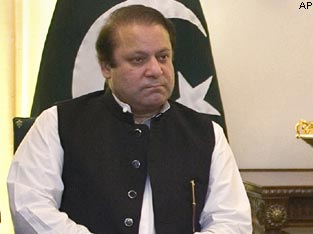
Nawaz Sharif’s only agenda was to make money. In order to achieve this goal, he formed/changed laws and policies for his personal benefit and expanded his business empire by misusing his authority as Prime Minister.
when the army seized power, Mr Sharif was arrested, and eventually sentenced to life imprisonment on charges of hijacking and terrorism.
The army has always been a highly powerful institution in Pakistan. Mr Sharif’s overthrow by General Musharraf in a bloodless coup showed how dangerous it was for any politician to attempt to curtail its influence.
Pakistan‘s former Prime Minister Nawaz Sharif is scheduled to face charges of corruption in court proceedings opening Friday in a 16th Century fort near
the capital. From Islamabad, Correspondent Scott Anger reports the new trial comes about a month after Sharif was sentenced to two concurrent life terms on
charges of hijacking and terrorism.
The new trial will be the first of three trials involving Pakistan’s former Prime Minister Nawaz Sharif on charges that he used his political influence to amass millions of dollars of wealth.
Anti-corruption officials with the military government’s National Accountability Bureau say the former prime minister purchased the Russian-made helicopter but failed to declare it among his assets.
It may not prove to be the principal act of corruption which we will finally find. Many other investigations are going on. It is a joint (Sharif) family system
they have built up over the past few years while they were holding political office. It is probably one of the greatest industrial empires in Asia. It is a huge
industrial empire and, as we believe, has been built up primarily on the proceeds of crime. The poor South Asia nation has been borrowing money for years from international lending institutions, but has little to show for it. Pakistan’s foreign debt is about 38 billion dollars and most of the country’s 140 million people live in poverty. A majority of the population does not have access to clean drinking
water or education.
Musharraf had Sharif and his brother Shahbaz tried on charges of hijacking, terrorism and attempted murder and while Shahbaz and six co-defendants were acquitted in April 2000, Sharif himself was convicted and sentenced to life imprisonment.
On August 29, 1998 then Prime Minister Nawaz Sharif proposed a law to create an Islamic order in Pakistan and establish a legal system based on the Quran and the Sunnat. Sharif told Pakistanis that the proposed Shariat Bill was a charter of duties and not power. On October 8, 1998 Pakistan Prime Minister Nawaz Sharif presented the Shariat Bill in the National Assembly. The Cabinet decided to present the bill on October 9, after removing some of its controversial aspects
Nawaz Sharif said: “I congratulate the nation on the passage of the bill which will help create a truly Islamic system”.
On January 16, 1999 the Nawaz Sharif Government imposed Islamic law in the traditional tribal areas of the north-west straddling the Pakistan-Afghanistan border, vowing to impose it throughout the country
The Accountability Court of Pakistan has also disqualified him from holding any public office for 21 years, and fined him 20 million rupees, about US$3,700,000
World Bank Corruption
Independent Evaluation Group (IEG) Vinod Thomas, Director-General
www.WorldBank.org/ieg
http://www.fas.org/news/pakistan/2000/000511-pak1.htm
http://english.aljazeera.net/news/asia/2007/09/200852513504192772.html
http://www.guardian.co.uk/world/2008/sep/02/pakistan
http://news.bbc.co.uk/2/hi/south_asia/472836.stm
http://www.nawazsharifexposed.com/Nawaz.htm
http://www.cbc.ca/world/story/2007/09/07/pakistan-corruption.html
http://musharrafsupporters.wordpress.com/2007/12/10/exposing-nawaz-sharifs-corruption/
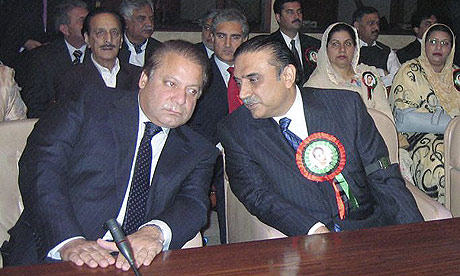
Asif Zardari belongs to a Shi’a muslim family from the town of Nawabshah in Sindh. Asif acquired his high school education from Cadet College Petaro. That is the only education he has received. However, later while trying to run for the parliament, that requires its members to have a bachelors degree owing to the 17th amendment, Zardari claimed to have graduated from a college in London which did not exist. He is also called Mr. ten percent for his corrupt activities while his wife was Prime Minister.
Until his marriage with Benazir Bhutto on 18 December 1987, he was a relatively unknown figure on the political scene of Pakistan.[
Zardari was accused of money-laundering activities in a US Senate report on private banking and money-laundering.
Zardari remains under criminal investigation in Switzerland over reciepts of kickbacks from two Swiss-based companies while his wife, the late Benazir Bhutto, served as the country’s prime minister in the 1990s, a Swiss judge and two Swiss lawyers close to the case told NEWSWEEK. Judge Daniel Devaud is to continue investigations despite pressure from US officials, he is the investigating magistrate in Geneva who has handled many high-profile investigations into laundering of corrupt payments through Switzerland by foreign politicians.
Outstanding Legal Cases
The most significant European cases are a Swiss money-laundering inquiry and a British civil case.
But in 2003, a Swiss investigative magistrate decided he had evidence of Zardari and Bhutto after pursuing a money trail from offshore companies in the Caribbean to banks in Geneva to a jewelry shop here.
Judge Daniel Devaud took advantage of a Swiss law allowing investigative magistrates to issue a summary verdict if they think the evidence is strong, and convicted Zardari and Bhutto of money laundering. A new magistrate reopened the investigation on charges of aggravated money laundering, a more serious offense based on the suspicion of systematic criminal activity. “Mr. Zardari denies having committed any crime whatsoever,” the lawyer, Saverio Lembo, said in an interview before Bhutto’s assassination.
In his 2003 verdict, the Swiss judge connected Zardari to a chain of corruption that began with two Swiss companies, Cotecna and SGS. Starting in 1994, company executives courted Zardari in hopes of landing a contract to provide container inspection equipment and expertise to the Pakistani customs agency, according to Swiss court records.
As part of a secret deal, the judge found, the Swiss contractors funneled $11.9 million in bribes into three offshore firms in the British Virgin Islands and ultimately into bank accounts in Geneva. The nominal owners of two companies were Bhutto’s mother and brother-in-law, according to the records.
The judge found that Zardari owned the third company, Bomer Finance, which received about $8 million, and that “Bhutto shares with her husband the assets” and “has power of disposition” over the company, according to the documents.
In Britain, the decade-old civil proceedings focus on Zardari. Zardari is accused of using illicit funds to acquire the 365-acre Rockwood estate, a $6.5-million property featuring a Tudor-style mansion and two adjoining farms in the Surrey district. The estate was bought and refurbished in 1995 through trusts in the Isle of Man and Liechtenstein and the Caribbean firms linked to Bhutto, Zardari and the alleged kickbacks, according to the lawsuit.
Zardari steadfastly denied ownership until January 2006, when he acknowledged he owned the property, according to British court records. The judge did rule that there is a “reasonable prospect” of proving that funds used to refurbish the estate were “the fruits of corruption,” according to the documents.
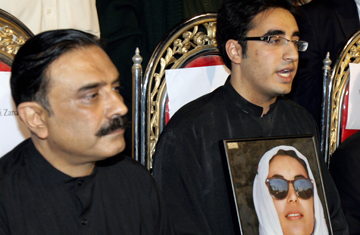
HOUSE OF GRAFT: Tracing the Bhutto Millions — A special report.; Bhutto Clan Leaves Trail of Corruption
A decade after she led this impoverished nation from military rule to democracy, Benazir Bhutto is at the heart of a widening corruption inquiry that Pakistani investigators say has traced more than $100 million to foreign bank accounts and properties controlled by Ms. Bhutto’s family.
Starting from a cache of Bhutto family documents bought for $1 million from a shadowy intermediary, the investigators have detailed a pattern of secret payments by foreign companies that sought favors during Ms. Bhutto’s two terms as Prime Minister.
The documents leave uncertain the degree of involvement by Ms. Bhutto, a Harvard graduate whose rise to power in 1988 made her the first woman to lead a Muslim country. But they trace the pervasive role of her husband, Asif Ali Zardari, who turned his marriage to Ms. Bhutto into a source of virtually unchallengeable power.
In 1995, a leading French military contractor, Dassault Aviation, agreed to pay Mr. Zardari and a Pakistani partner $200 million for a $4 billion jet fighter deal that fell apart only when Ms. Bhutto’s Government was dismissed. In another deal, a leading Swiss company hired to curb customs fraud in Pakistan paid millions of dollars between 1994 and 1996 to offshore companies controlled by Mr. Zardari and Ms. Bhutto’s widowed mother, Nusrat.
In the largest single payment investigators have discovered, a gold bullion dealer in the Middle East was shown to have deposited at least $10 million into an account controlled by Mr. Zardari after the Bhutto Government gave him a monopoly on gold imports that sustained Pakistan’s jewelry industry. The money was deposited into a Citibank account in the United Arab Emirate of Dubai, one of several Citibank accounts for companies owned by Mr. Zardari.
Together, the documents provided an extraordinarily detailed look at high-level corruption in Pakistan, a nation so poor that perhaps 70 percent of its 130 million people are illiterate, and millions have no proper shelter, no schools, no hospitals, not even safe drinking water. During Ms. Bhutto’s five years in power, the economy became so enfeebled that she spent much of her time negotiating new foreign loans to stave off default on $62 billion in public debt.
A worldwide search for properties secretly bought by the Bhutto family is still in its early stages. But the inquiry has already found that Mr. Zardari went on a shopping spree in the mid-1990’s, purchasing among other things a $4 million, 355-acre estate south of London. In 1994 and 1995, he used a Swiss bank account and an American Express card to buy jewelry worth $660,000 — including $246,000 at Cartier Inc. and Bulgari Corp. in Beverly Hills, Calif., in barely a month.
In separate interviews in Karachi, Ms. Bhutto, 44, and Mr. Zardari, 42, declined to address specific questions about the Pakistani inquiry, which they dismissed as a political vendetta by Ms. Bhutto’s successor as Prime Minister, Nawaz Sharif. In Karachi Central Prison, where he has been held for 14 months on charges of murdering Ms. Bhutto’s brother, Mr. Zardari described the corruption allegations as part of a ”meaningless game.” But he offered no challenge to the authenticity of the documents tracing some of his most lucrative deals.
Ms. Bhutto originally kindled wild enthusiasms in Pakistan with her populist politics, then suffered a heavy loss of support as the corruption allegations gained credence. In an interview at her fortresslike home set back from Karachi’s Arabian Sea beachfront, she was by turns tearful and defiant. ”Most of those documents are fabricated,” she said, ”and the stories that have been spun around them are absolutely wrong.”
But she refused to discuss any of the specific deals outlined in the documents, and did not explain how her husband had paid for his property and jewelry. Lamenting what she described as ”the irreparable damage done to my standing in the world” by the corruption inquiry, she said her family had inherited wealth, although not on the scale implied by tales of huge bank deposits and luxury properties overseas.
”I mean, what is poor and what is rich?” Ms. Bhutto asked. ”If you mean, am I rich by European standards, do I have a billion dollars, or even a hundred million dollars, even half that, no, I do not. But if you mean that I’m ordinary rich, yes, my father had three children studying at Harvard as undergraduates at the same time. But this wealth never meant anything to my brothers or me.”
Zardari’s critics insist he has ascended to power only because of the death of his wife and has neither the governing skills nor the experience to pull the country out of its present crisis. His supporters strongly disagree, insisting he is the best man to bring peace and stability to Pakistan because of the powers he will inherit from the military regime of President Musharraf and his role as leader of the governing PPP party.
Armed with such sweeping powers, Zardari would become one of the most powerful civilian presidents in Pakistan’s history. He would have the authority to dismiss the government, sack the army and intelligence chiefs, appoint judges and control Pakistan’s nukes
Zardari refuses to answer questions from political opponents who wonder how he acquired his vast fortunes given that he does not come from great wealth. Last week, London’s Financial Times newspaper reported that Zardari had presented medical certificates to the English High Court as recently as last year stating he was suffering from severe psychiatric problems, including dementia. “We cannot trust a President who is a liar and who does not honor his promises. Before he was Mr. 10 percent. Now he will become Mr. 100 percent and, who knows, next he may sell the country,” said Muhammed Iqbal Tanoli, an Islamabad lawyer who took part yesterday in a sit-in by the country’s lawyers in front of the parliament demanding Zardari restore the judiciary.
Pakistanis will now be watching Zardari’s relations with the country’s powerful army.
Zardari seems to have convinced the U.S. government that he will cooperate more fully than President Musharraf in going after Islamic militants. So far, Zardari’s party has alternated between peace deals with the militants and highly unpopular military operations — the majority of Pakistanis still view the war on terror as America’s war.
http://www.riazhaq.com/2008/08/zardari-corruption-probe-alive-in.html http://ihsan-net.blogspot.com/2005/05/mosque-and-state.html http://ihsan-net.blogspot.com/2007/12/benazir-bhutto-fall-of-corrupt-puppet.html
http://worldblog.msnbc.msn.com/archive/2008/09/05/1354789.aspx
http://en.wikipedia.org/wiki/Asif_Ali_Zardari
http://query.nytimes.com/gst/fullpage.html?res=9B0CE5D91F30F93AA35752C0A96E958260
Zardari Corruption Cases Lifted http://www.asia-monitor.com/file/63454/zardari-corruption-cases-lifted.html
Pakistan has withdrawn its support as a civil party in a Swiss probe into alleged money laundering by Pakistan People’s Party (PPP) leader Asif Ali Zardari. About CHF60.0mn (US$59.6mn) remains frozen in Swiss accounts while Geneva’s chief prosecutor decides whether to bring the case to trial. The probe was started after a 2003 conviction of money laundering was overturned on appeal. Meanwhile in Pakistan, a local court quashed the final seven corruption cases outstanding against Zardari in March, and also ordered the government to withdraw all legal action against him overseas. As a result, Zardari can now stand for election in order to hold office.
Corruption allegations still haunt Pakistan’s new power.
Asif Ali Zardari, the Pakistani politician considered a front runner to become the country’s next president, remains under criminal investigation in Switzerland over allegations that he received kickbacks from two Swiss-based companies while his wife, the late Benazir Bhutto, served as the country’s prime minister in the 1990s, a Swiss judge and two Swiss lawyers close to the case told NEWSWEEK.
But Zardari, who has always claimed that corruption allegations against him were politically motivated, may be using his growing political clout in Islamabad to pressure Swiss authorities to curtail, or even close, their long-running investigation into his affairs, say Swiss legal sources, who requested anonymity discussing sensitive matters.
Zadari, through a spokeswoman, maintains that the probe is already closed. “Mr. Zardari feels that you have been misinformed and that the case that you are referring to is closed,” wrote Farah Ispahani, in response to an e-mail from NEWSWEEK. “Please be careful about reporting something that may have been planted.”
Zardari, who co-chairs Bhutto’s political movement and was one of her closest advisers when she headed Pakistan‘s government, has emerged as perhaps the most powerful figure in Pakistani politics following the resignation this week of President Pervez Musharraf. U.S. officials say they already view Zardari as one of most important Pakistani officials the U.S. deals with on sensitive issues such as the hunt for Al Qaeda and Taliban leaders in volatile tribal areas along the country’s border with Afghanistan.
But U.S. officials remain wary of Zardari because of corruption allegations that have swirled around him for years. In the 1990s, when Bhutto served two terms as prime minister and her spouse served a stint as investment minister, Zardari earned the nickname of “Mr. Ten Percent” because of allegations that he had received kickbacks on state contracts. He spent more than eight years in jail in Pakistan during corruption investigations, though he was never convicted of any crime.
The Swiss investigations were opened years ago, during Sharif’s tenure as prime minister. His government requested official legal assistance from Switzerland, where Pakistani authorities suspected that the couple had stashed proceeds from alleged corrupt activities. The Pakistani government hired its own lawyers in Switzerland to gather evidence against Bhutto and Zardari and help Swiss investigators with their inquiries.
In 2003, these investigations resulted in a series of court orders against Bhutto, Zardari and one of their Swiss lawyers, Jens Schlegelmilch. The orders, akin to misdemeanor guilty findings by a U.S. justice of the peace, were issued by Judge Daniel Devaud, an investigating magistrate in Geneva who has handled many high-profile investigations into the alleged laundering of corrupt payments through Switzerland by foreign politicians.
Devaud’s orders found Bhutto, Zardari and Schlegelmilch, a Swiss lawyer who had represented them for many years, guilty of minor money-laundering offenses under Switzerland’s penal code. Devaud’s orders alleged that, via obscure companies in the British Virgin Islands, Bhutto, Zardari and members of their family had received improper payments from two Swiss companies that were seeking contracts with the Pakistani government. (Pakistan wanted to hire the companies, Cotecna and SGS, to inspect cargo shipments before they arrived to ensure that appropriate import duties had been assessed).
However, two other Swiss legal sources close to the case, who asked for anonymity when discussing sensitive information, said they believe the Geneva prosecutor could continue to pursue the case, given that the investigation did turn up evidence, which was not exclusively supplied by Pakistan, of violation of Swiss money-laundering laws. Ultimately, said one of the sources, Swiss prosecutors have three possible courses of action: close the case entirely, prosecute it by bringing it into a superior court or arrange the Swiss version of a plea bargain, in which money seized by Swiss authorities during the investigation probably would be confiscated or handed over to charity, but charges would be settled without any prison sentences.
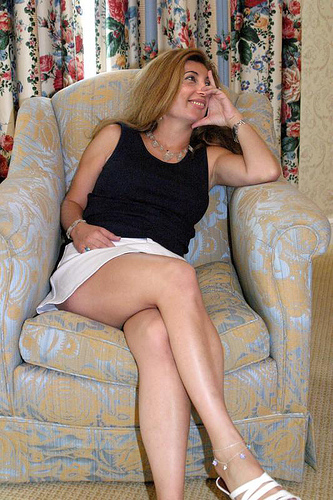
Benazir Bhutto’s homely dress is not a match of pakistani women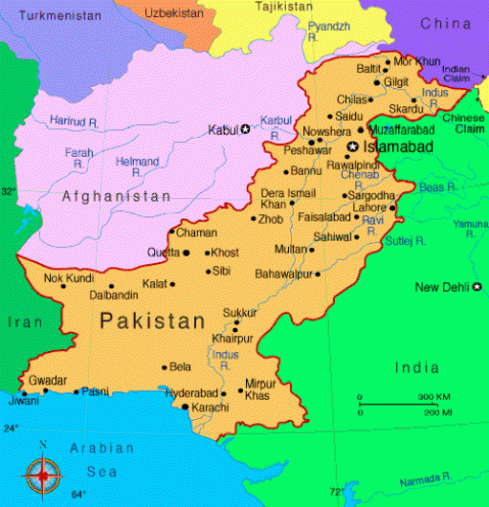

4 comments
Comments feed for this article
December 27, 2008 at 9:49 pm
farrah k raja
Gosh!
Is she really Benazir?
December 27, 2008 at 10:11 pm
farrah k raja
Not only that NAWAZ SHRIEF planned to crash the plane PIA,which was full of passengers,children,women and men and it had our than COAS of Pakistan Perviaz Musharaff on board ,Nawaz plan was to force plane either to land in India or crash.
SO HE WANTED TO SEND OUR COAS TO INDIA.
————–
Mr ZARDARI is no different either
On India’s demand Zardari asked our ISI chief to go to India for what?and Why ?Are we Sovereign and Independent state or an extension of India?
————————————
USA has sarted to attack inside Pakistan and they are openly saying that
Talibaan are in Waziristan.
What is Zaradri’s response?People are deying,Pakistan soldiers are deying?
———————————————
My question apart from corruption from Zardari and Nawaz both is what Nawaz did to his own soldiers at the time of Kargil,Nawaz backed out blamming everything on than COAS Musharaff,would Zardari do the same if soemthing happened in Kashmir.
Looking at the maps above it seems “YES”
—————————————–
People it is our country not the matter of choice of political leaders
It is the matter of choice of our survival,of our country.
—————————-
February 23, 2009 at 6:14 pm
zara batool
Karachi, On 19th Jan 2009, 15 years old seraiki community Imam Bargah “Babul Hawaij” Gulistan-e-Johar Karachi has been demolished by S.H.O, Police Station Gulistan-e-Johar name Nasrullah (YAZEED),
On 15th Jan 2009 S.H.O, Nasrullah (YAZEED) along with police constabulary attack Imam Bargah Babul Hawaij destroyed ALAM BUBARAK (GHAZI ABBAS) and thrown all the wall around the ALAM BUBARAK,
On 16th Jan 2009 all the newspaper of Pakistan cover this act; especially details came in “Daily Janbaz” and “Daily Morning Special”, Karachi.
In response to this act of sectarian hatred Seraiki Shia submitted application to D.I.G (East) and T.P.O (Gulshan Iqbal Town) against the S.H.O Nasrullah (YAZEED) but there is no action taken yet,
When S.H.O Nasrullah going to SHAHEED, IMAM BARGAH BABUL HAWAiJ worshiper or follower of Seraiki Shia community intervene specially women’s who belongs to famous Seraiki Shia ZAKIR of KOTT ADDU, Mr. Ahmed Bux Bhatti (Late) and ZAKIR Qasir Abbas Bhatti, S.H.O don’t listen to them even beaten women with baton charge and arrested 4 Seraiki Shia Zakir on the spot and criminal beaten them and made false case against the Administration of Imam Bargah Babul Hawaij, S.H.O malafidely made his personal taught as a complainant and booked 4 Seraiki Shia follower in case F.I.R No 27/2009 and sent all the 4 innocent Shia followers to Jail.
Mainly for the past 5 years followers of Seraiki Shia community has been conducting all the religious activities along with ASHRA, MAJALIS and taken JALOSS in the month of Muharram-ul-Haram from this IMAM BARGAH BABUL HAWAIJ.
S.H.O, Nasrullah (YAZEED) described this act under the direction of Karachi City Nazim Mustafa Kamal and Town Nazim Gulshan-e-Iqbal, Mr Waseh Jalil, after this act of destruction of IMAM BARGAH BABUL HAWAIJ thousand of Seraiki Shia Community has hatred against (M.Q.M) Mutahida Quami Movement.
These followers has submitted application against S.H.O Nasrullah (YAZEED), Police Station Gulistan-e-Johar to President of Pakistan Asif Ali Zardari, Chief Justice Supreme Court of Pakistan, Chief Minister of Sindh, Governor Sindh, Inspector General of Sindh, C.C.P.O Karachi, D.I.G East and demand them to suspend S.H.O Nasrullah (YAZEED) of Police Station Gulistan-e-Jouhar Karachi and rebuild the IMAM BARGAH BABUL HAWAIJ.
Sources explained S.H.O Nasrullah (YAZEED) has taken 8 lac rupees as a bribery from the land mafia to demolished Imam Bargah and hand over that plot to them.
Another act On 22nd Feb 2009, S.H.O Nasrullah (YAZEED) of Police Station Gulistan-e-Jouhar Karachi has arrested famous Shia NOHA KHAWAN, Irfan Ali Naushad and Shia leader Hussain Shah in false case F.I.R No 91/2009 under section 427 A, 511,435,147,148,149.
ZAHRA BATOOL
Email:zahrabatool777@yahoo.com
http://www.flickr. com/photos/ 35676488@ N04/
April 25, 2009 at 12:43 am
Mona
Excellent article. It shows the dual life that Benazir Bhutto led. It would make good contrast if you show both her photos together. You know the casual one at the bottom should be at the top with the formal one.